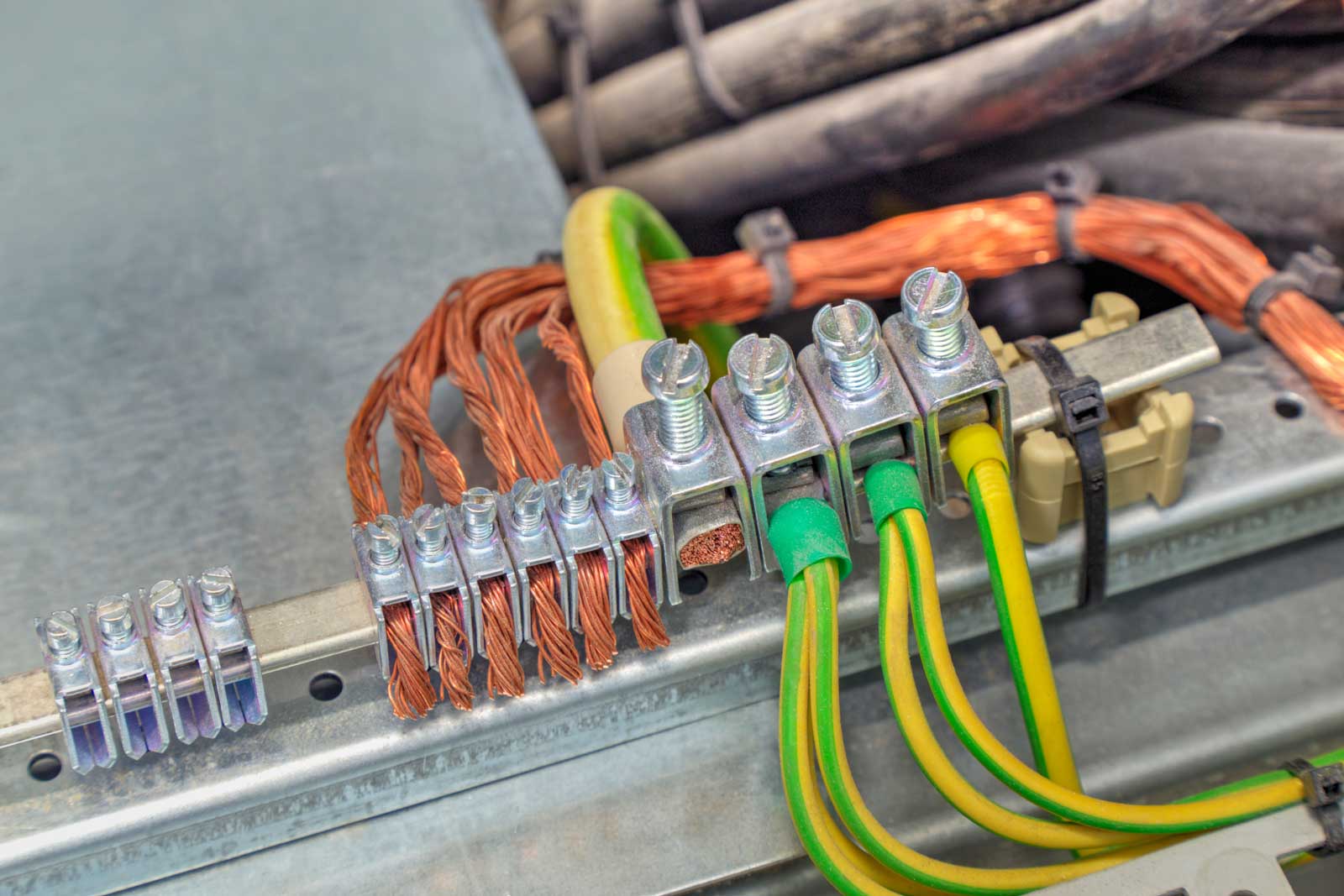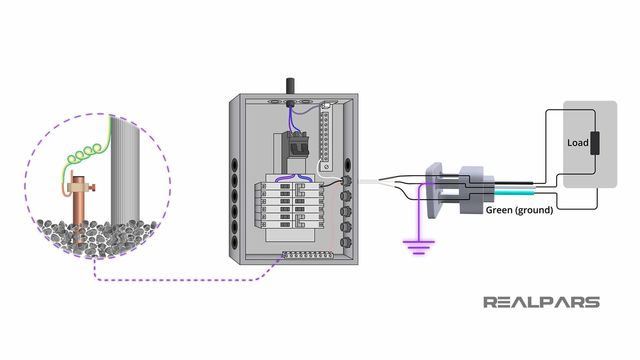Grounding is important in electricity to prevent electrical shock and equipment damage. Grounding provides a path for excess electrical energy to safely dissipate into the ground, reducing the risk of injury and damage.
Without proper grounding, electrical systems may experience electrical faults, increased risk of fire, and malfunctioning equipment. Electrical grounding protects both individuals working with electricity and the electrical systems themselves. It is a vital safety measure that ensures the safe and effective operation of electrical systems, minimizing the risk of electrical hazards and promoting a safe working environment.

Credit: www.macproducts.net
The Basics Of Grounding
Grounding in electricity is crucial for safety as it prevents electrical shocks by providing a path for excess current to flow harmlessly into the ground. It also helps stabilize voltage levels and protects electrical equipment from damage caused by power surges.
Definition Of Grounding
Grounding is a vital concept in the world of electricity. It involves connecting electrical systems and devices to the earth using a conductor, typically copper or aluminum. This conductor acts as a pathway to redirect excess electrical current safely into the ground, preventing damage to the system and reducing the risk of electrical shock.
Purpose Of Grounding
The primary purpose of grounding is to ensure safety in electrical installations. By establishing a connection to the earth, grounding provides a path of least resistance for electrical current. This means that in the event of a fault, such as a short circuit or electrical surge, the excess current is directed away from the system and into the ground, minimizing damage and potential hazards.
Beyond safety, grounding also helps to stabilize electrical equipment and improve its performance. When electrical systems aren’t properly grounded, they can build up static charges or experience voltage fluctuations, which can result in malfunctions or damage to sensitive equipment. By effectively grounding the system, these issues are mitigated, allowing for more reliable operation and extending the lifespan of the equipment.
Another important aspect of grounding is electromagnetic shielding. Electrical devices generate electromagnetic fields (EMFs), which can interfere with other equipment or cause signal distortions. Grounding helps to dissipate these unwanted fields, reducing interference and ensuring the proper functioning of sensitive electronics in the vicinity.
Overall, grounding plays a crucial role in electrical systems by ensuring safety, stabilizing performance, and reducing interference. It is a fundamental concept that should be implemented in all electrical installations to protect both individuals and equipment from harm.
Safety Benefits Of Grounding
Grounding in electricity is crucial for safety, as it helps prevent electrical shocks and fires by providing a safe path for excess energy to dissipate into the ground. This grounding system protects both people and equipment from potential hazards.
Safety Benefits of Grounding Grounding is an essential safety measure in electrical systems, providing numerous benefits that help protect people and property. By safeguarding against electric shocks and preventing electrical fires, grounding plays a crucial role in ensuring the overall safety of electrical installations.
Protection Against Electric Shocks
Grounding shields individuals from the risk of electric shocks by providing a pathway for the dissipation of excess electrical current. When a fault occurs, the system directs the current to the ground instead of flowing through a person’s body, significantly reducing the likelihood of injury or fatality.
Prevention Of Electrical Fires
Proper grounding helps to redirect excessive electrical current, which can potentially lead to overheating and igniting of flammable materials. This prevents the occurrence of electrical fires, contributing to a safer environment for occupants and minimizing the risk of property damage. In summary, grounding not only reduces the risk of electric shocks but also prevents the occurrence of electrical fires, thus making it an essential safety measure in electrical systems.
Stability Aspects Of Grounding
Stability is a critical aspect of grounding in electrical systems. It ensures the safe and reliable operation of equipment, effectively protecting it from potential hazards. By providing a low-resistance path for fault currents, grounding plays a vital role in maintaining stability within an electrical system.
Equipment Protection
The grounding of electrical systems serves as a safeguard against overvoltages and faults. Proper grounding effectively reduces the risk of equipment damage caused by lightning strikes, power surges, and electrical faults. Additionally, it prevents the buildup of static charges, promoting the longevity and reliability of electrical equipment. Grounding fosters a secure environment for the operation of machinery and electronic devices, emphasizing the significance of equipment protection.
Reduction Of Electrical Noise
Grounding is essential for minimizing electrical noise within an electrical system. By providing a reference point for electrical signals and circuits, grounding reduces interference and improves signal integrity. This reduction in noise contributes to the stability of the system, enhancing the performance of sensitive electronic equipment and communication systems.Eliminating electrical noise through proper grounding ensures the efficient operation of electrical and electronic devices.
Grounding Techniques
Grounding is an essential aspect of electrical systems, providing a safe path for electrical currents to flow in case of a fault or malfunction. In the previous sections, we discussed why grounding is important in electricity. Now, let’s explore the various grounding techniques that are commonly used in electrical installations.
Types Of Grounding Systems
In electrical systems, grounding can be achieved through different types of grounding systems. Some of the most widely used grounding systems include:
| Grounding System | Description |
|---|---|
| Earth Grounding | This is the most common grounding system where electrical equipment and installations are connected to the earth through grounding electrodes such as grounding rods or plates. |
| Equipment Grounding | In this system, each individual electrical equipment is connected to a common ground, which provides a path for fault currents to flow, ensuring the safety of both the equipment and the users. |
| System Grounding | System grounding involves connecting one of the conductors of the electrical system, typically the neutral conductor, to the earth ground. This helps in minimizing the voltage potential between the system and the ground. |
Proper Grounding Practices
While having the right grounding system is important, it is equally crucial to adhere to proper grounding practices. Here are some key practices to ensure effective grounding:
- Use proper grounding equipment: High-quality grounding electrodes, conductors, and connectors should be used to establish reliable electrical connections.
- Maintain low impedance: Grounding systems should be designed and installed in a way that minimizes the impedance between the electrical system and the ground to allow fault currents to flow easily.
- Ensure proper earthing: All electrical equipment and installations should be effectively bonded and grounded to prevent the buildup of unwanted voltage.
- Regular maintenance: Periodic inspection and testing of grounding systems help identify any faults or issues that may compromise the effectiveness of the grounding system.
- Adhere to local regulations: It is essential to follow the specific grounding requirements outlined by local electrical codes and standards to ensure compliance and safety.
By implementing these proper grounding practices, electrical systems can ensure the safety of both the equipment and the individuals using them.
Grounding In Different Settings
In the realm of electricity, grounding plays a crucial role in ensuring safety and protection against electrical hazards. Let’s delve into how grounding is implemented in various settings:
Residential Grounding
In residences, grounding is essential to safeguard inhabitants from electric shocks caused by faulty appliances or lightning strikes. It involves connecting the electrical system to the ground to redirect excess electricity safely.
Commercial And Industrial Grounding
Commercial and industrial settings require more robust grounding due to higher electrical loads. Proper grounding prevents electrical fires and ensures the uninterrupted operation of machinery and equipment.

Credit: www.acdc-electric.com
Common Grounding Mistakes
Grounding is crucial in electricity for safety and proper functioning. However, many people make common mistakes that can lead to electrical hazards. It is important to understand the significance of grounding and avoid these errors to ensure a safe electrical system.
Grounding is crucial in electricity to protect against dangerous faults. Understanding and avoiding common grounding mistakes can prevent potential hazards.
Overloading Grounding System
Connecting too many electrical devices to a single grounding point can lead to system overloading.
Inadequate Maintenance
Ignoring regular inspections and maintenance can cause grounding systems to deteriorate over time.
Importance Of Grounding In Lightning Protection
Grounding is a crucial aspect of electrical systems, especially when it comes to the protection against lightning strikes. Proper grounding plays a vital role in diverting the immense energy of lightning to the ground safely, preventing damage to equipment and ensuring the safety of individuals and structures. Understanding the importance of grounding in lightning protection is essential for maintaining the safety and integrity of electrical systems.
Redirecting Lightning Strikes Safely
Redirecting lightning is essential for the safety of buildings and individuals. Proper grounding provides a path for the lightning’s electrical energy to be safely dispersed into the ground, away from structures and people. With a well-established grounding system, the risk of damage due to lightning strikes can be significantly reduced. Effective grounding ensures that lightning does not cause harm to the electrical systems or create hazards within the building.
Preventing Equipment Damage
The importance of grounding in preventing equipment damage cannot be overstated. When lightning strikes, without appropriate grounding, it can induce high voltages and currents that may damage electrical devices, appliances, and systems. Proper grounding dissipates this energy harmlessly into the earth, safeguarding the equipment from potential destruction. Effective grounding measures are essential for the longevity and protection of electrical equipment.
Regulatory Requirements For Grounding
Grounding plays a crucial role in electricity as it helps to prevent electrical overloads and ensures safety for both people and equipment. Compliance with regulatory requirements for grounding is essential to minimize the risk of electrical hazards and maintain a secure working environment.
Proper grounding also helps to avoid potential damage to electrical devices and systems.
Grounding is a critical aspect of electrical systems that ensures safety and prevents electrical hazards. Understanding the regulatory requirements for grounding is essential for compliance in electrical installations. The industry has set specific standards and guidelines that every electrical system must adhere to. Let’s take a closer look at these requirements.
Industry Standards
Industry standards serve as benchmarks and guidelines for electrical installations. These standards provide a systematic approach to grounding, ensuring a safe and reliable electrical system. Some of the key industry standards for grounding include:
- NEC (National Electrical Code) in the United States
- IEC (International Electrotechnical Commission) standards
- IEEE (Institute of Electrical and Electronics Engineers) standards
- Local building codes and regulations
These standards define the minimum requirements for grounding, covering various aspects such as grounding electrodes, grounding conductors, and grounding methods. Compliance with these standards is crucial for maintaining electrical safety.
Compliance In Electrical Installations
Electrical installations must comply with the regulatory requirements for grounding to ensure safety and prevent electrical accidents. Here are some key factors to consider in achieving compliance:
- Grounding Electrodes: The installation should have correctly sized and properly installed grounding electrodes. These electrodes provide a low-resistance path to redirect excessive currents to the earth.
- Grounding Conductors: Properly sized grounding conductors help in efficiently transferring fault currents to the grounding electrodes. These conductors must be installed according to the industry standards to maintain electrical safety.
- Equipment Grounding: All electrical equipment, including outlets, switches, and appliances, must be grounded to prevent electric shock and fire hazards. Grounding these components provides a path for fault currents, ensuring prompt circuit interruption.
- Bonding: Bonding is the process of connecting metallic objects within an electrical system to ensure electrical continuity and minimize voltage differences. Proper bonding techniques prevent potential hazards due to different ground potentials.
Note: It is crucial to consult with a qualified electrician or follow the recommendations of an electrical engineer when planning and implementing grounding in your electrical installations.
Frequently Asked Questions For Why Is Grounding Important In Electricity
What Is Electrical Grounding And Why Is It Important?
Electrical grounding is the process of connecting electrical circuits to the earth to prevent potential electrical hazards. It helps in redirecting electrical surges and preventing the risk of electric shock, fire, and equipment damage.
How Does Grounding Protect Electrical Equipment?
Grounding protects electrical equipment by providing a path for discharging excess electrical current safely into the ground. It helps to stabilize voltage levels, reduce the risk of electrical fires, and prevent damage to the equipment caused by power surges.
What Are The Potential Dangers Of Not Having Proper Grounding?
Lack of proper grounding can lead to electrical hazards such as electric shocks, equipment damage, and fire hazards. It also increases the risk of electrocution and may render surge protectors and other safety systems ineffective.
Can Grounding Improve The Stability Of Electrical Systems?
Yes, grounding helps in stabilizing electrical systems by reducing potential differences and minimizing voltage spikes. It also enhances the effectiveness of surge protectors and minimizes disruptions in power supply, improving overall system stability.
Conclusion
Grounding is an essential aspect of electrical systems, ensuring safety and protection from electrical shocks. By providing a pathway for electric current to flow into the earth, grounding prevents the buildup of excess voltage. This is especially important in modern households where electrical devices are ubiquitous.
From safeguarding appliances to protecting individuals from potential harm, grounding plays a crucial role in maintaining a safe and effective electrical infrastructure. Make grounding a priority and ensure your electrical systems are properly grounded for a worry-free existence.




